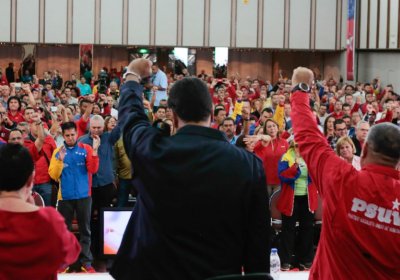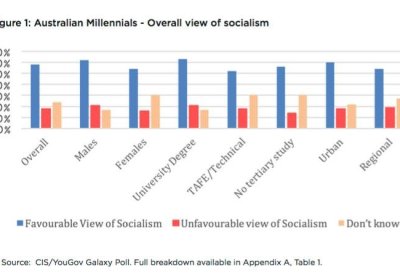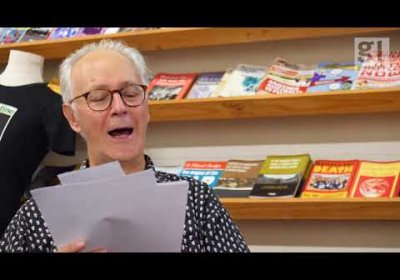Venezuela’s campesino marchers achieved their immediate objective on August 2 by holding a public meeting with President Nicolas Maduro in Caracas that was nationally televised. They presented proposals for far-reaching reforms to state agrarian policies and institutions.
Socialism
The fourth national congress of Venezuela’s largest political party, the United Socialist Party of Venezuela (PSUV), wound up on July 30 following three days of intense activities. The congress was inaugurated on July 28, on the 64th birthday of the party’s late founder, Hugo Chavez.
The PSUV congress took place in an increasingly complicated context, amidst a collapsing economy, hyperinflation, international financial sanctions and an upcoming monetary reconversion.
A large contingent of Venezuelan campesinos marched across the country for almost three weeks in what they called the “Admirable Campesino March” to raise awareness about the many problems faced by small farmers, including evictions, harassment and general neglect at the hands of government institutions.
The marchers, who first set off on July 12 from the city of Guanare, Portuguesa state, arrived in Caracas on August 1 with the plan to deliver a collective document that presents both their complaints and proposals to President Nicolas Maduro.
In common with many other countries, Turkey’s socialist movement has been marked by the dominance of men in positions of leadership and authority.
The patriarchy is a social order that has become dominant globally over the course of millennia and which connects with oppressive conceptions of the family, exploitation and inheritance — in short, with social class. Socialists cannot stand by as it recreates itself in the very structures we claim exist to overturn social stratification and oppression.
Ali Wazeer, a central committee member of The Struggle group, has won a seat in the national parliament with 23,530 votes on July 25. His closest rival for the seat, from a religious alliance, got only 7515.
A key leader of the Pashtun Tahafaz Movement (PTM), Wazeer was one the organisers of the mass meetings organised in major cities that demanded fair compensation to the victims of the “war on terror”. This campaign also demanded the release of all “missing” persons, or else that they be tried in court.
Overcoming a flood of corporate money and New York’s powerful establishment machine, 28-year-old democratic socialist Alexandria Ocasio-Cortez toppled Democratic Representative Joe Crowley in New York’s 14th congressional district on June 26 with tireless grassroots organising and an ambitious progressive agenda of Medicare for All, housing as a human right, and abolishing the hated Immigration and Customs Enforcement agency. The result is being hailed as the biggest political upset of 2018.
The Centre for Independent Studies (CIS), a right-wing think tank, is not at all happy with the results of a survey they commissioned from international polling agency YouGov Galaxy to find out the attitudes of “Millennials” (people born between 1980 and 1996) in Australia to socialism and capitalism.
The poll found 58% were favourable to socialism and 59% thought that “capitalism has failed and government should exercise more control of the economy”.
Ian Angus, editor of Climate and Capitalism, takes a look at six new books of interest to ecosocialists — from pro-corporate “environmentalism” to the struggle of indigenous peoples in Latin America and the scramble for Africa’s natural resources.
This year marks the 50th anniversary of the dramatic May-June 1968 upsurge in struggle by workers and students in France. The effects of this turbulent period, writes Stanley Blair, were felt around the world — and for years to come in France.
1968 was one of those extraordinary years when millions of people were involved in trying to change the world for the better. Hall Greenland writes that the year's most compelling events took place in May and June on the streets of France.
Even before Venezuela’s May 20 presidential vote had taken place, the United States —headed by a president who lost the popular vote in an electoral system that systematically disenfranchises millions of poor and non-white voters — rejected the elections as “neither free nor fair”.
The Lima Group, a coalition of 13 right-wing Latin American countries plus Canada, also refused to recognise the results. Among its members are:
Venezuelan President Nicolas Maduro won the Venezuelan presidential elections on May 20, gaining a second presidential term for six years with more than 5.8 million votes, the National Electoral Council (CNE) announced that night.
With 92.6 percent of the votes counted, Maduro had 5.8 million votes, while his closest rival, former governor Henri Falcón getting 1.8 million votes, said CNE President Tibisay Lucena who added that in total, 8.6 million Venezuelans voted, out of an electoral registry of 20.5 million people.
- Previous page
- Page 15
- Next page










